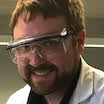Biography
Timo Kuester’s parents provided the first clue that he needed help engaging non-scientists in his work. When he tried to explain his research to them, “they clearly didn’t understand what I did, and I don’t blame them,” says Kuester, a PhD candidate in chemical engineering at the University of Rhode Island.
Kuester, an international URI student from Germany, is part of a team developing marine sensors to detect pollutants in Narragansett Bay. The research is being conducted under the leadership of Dr. Geoffrey Bothun, a URI professor of chemical engineering and principal investigator of the Rhode Island Consortium for Coastal Ecology and Assessment, Innovation and Modeling (RI C-AIM).
RI C-AIM is a collaboration of engineers, scientists, designers, and communicators from eight higher education institutions across Rhode Island developing new approaches to assess, predict and respond to the effects of climate change on coastal ecosystems. “I’m excited about being part of a huge collaborative group with brilliant people,” says Kuester. “Part of my work is to develop devices that we can use to house the sensors that will be deployed in the ocean to collect data on marine pollutants.”
Conducting scientific research is within Kuester’s comfort zone as a chemical engineer. Explaining it to people without scientific backgrounds, like his parents, presents a different challenge. “I was using a lot of jargon and technical terms,” he says.
Motivated by a desire to become a more effective communicator, Kuester has attended several of Metcalf Institute’s science communication programs, including workshops on messaging for various audiences, pitching stories to the media, and delivering effective scientific presentations. Most recently, Kuester has participated in Metcalf’s Career Development Program (CDP), a RI C-AIM initiative designed to build workplace skills among early-career researchers.
CDP participants have an opportunity to earn a Career Development Certificate focused on goal setting, diversity and inclusion, science communication, time management and mentoring through a series of interactive workshops.
Kuester was the first person in the program to fulfill all requirements and earn the Career Development certificate, a new credential he plans to proudly display on his CV. “I found the workshops to be empowering,” says Kuester. “I think I also have more confidence and I’m better prepared to enter the workforce.”
He’s now taking on workforce issues at URI as president of Graduate Assistants United, a union focused on ensuring that graduate students have fair working conditions. As for his future aspirations, Kuester, who expects to complete his PhD in 2021, plans to pursue a science career in the private sector.
Research
Timo Kuester’s parents provided the first clue that he needed help engaging non-scientists in his work. When he tried to explain his research to them, “they clearly didn’t understand what I did, and I don’t blame them.”

